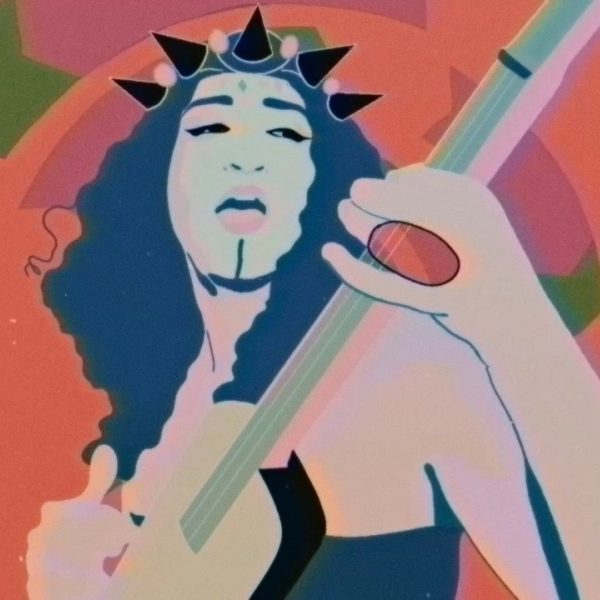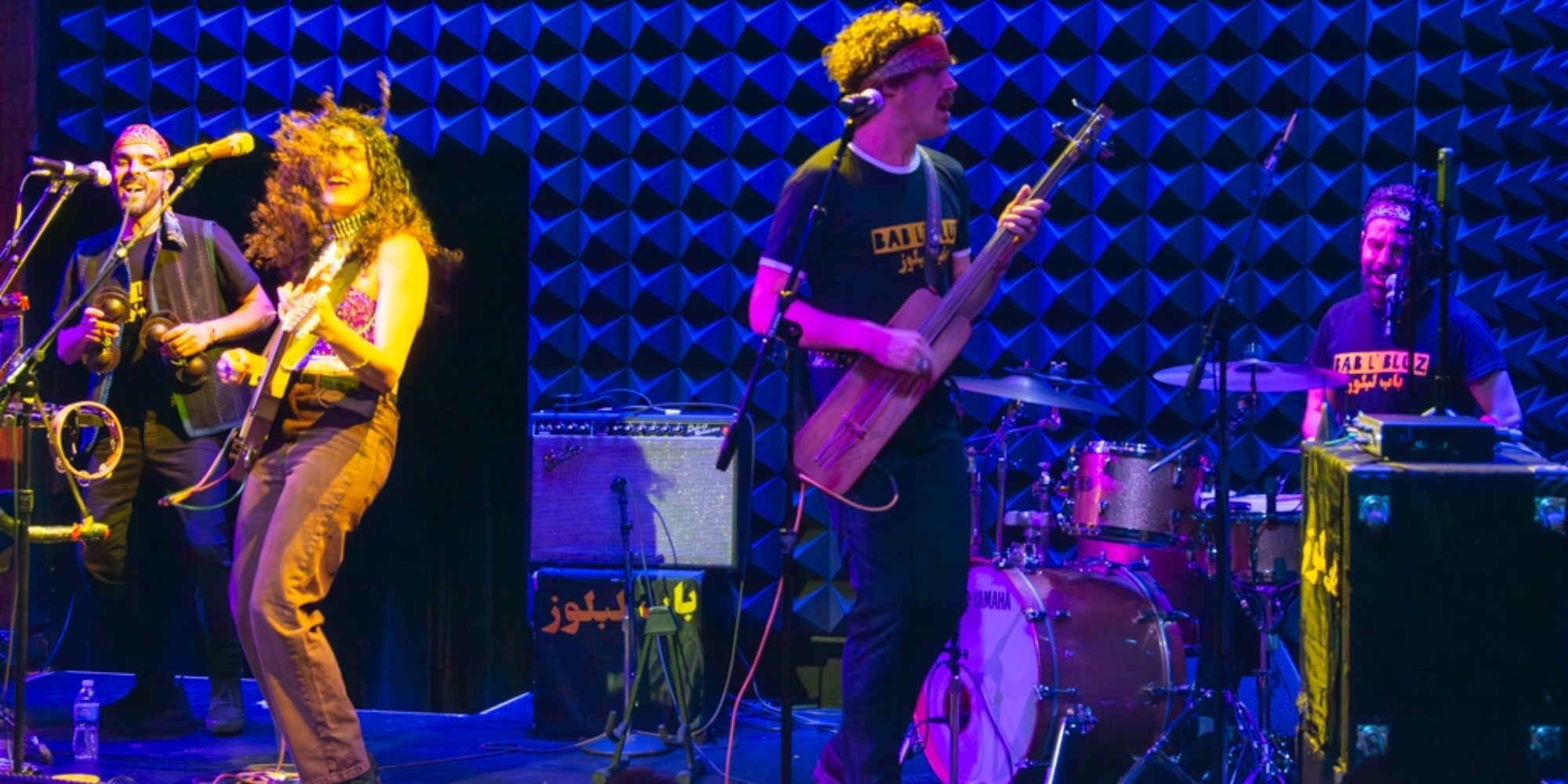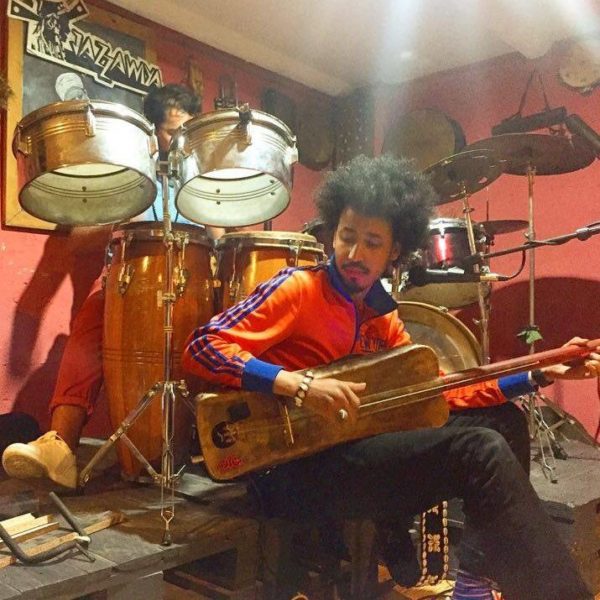On April 19, Moroccan rockers extraordinaire continued their 2025 U.S. tour at Joe's Pub in New York City, a performance in collaboration with the Habibi Festival. It was the first time the band has played their full set in the city. Previous appearances at Joe's and at globalFEST have left local fans hungry for more, and the packed crowd at Joe's was ecstatic from the first roaring notes.
Fronting this four-piece juggernaut, Yousra Mansour engaged the crowd with straight talk, artfully alluding to today's global chaos. She introduced a Yemeni Jewish song with a plea for peace, and the words, "Free Palestine," noting that the deaths of so many children in Gaza was somethng we cannot accept. She also told us that flying to America these days is a bit "scary" but worth it to play for a crowd like this.
A few weeks back, as Bab L'Bluz was preparing for this tour, Afropop's Ron Deutsch caught up with them at the Babel Music Expo in Marseilles. Here's their conversation, followed by Banning Eyre's images from the Joe's Pub show.
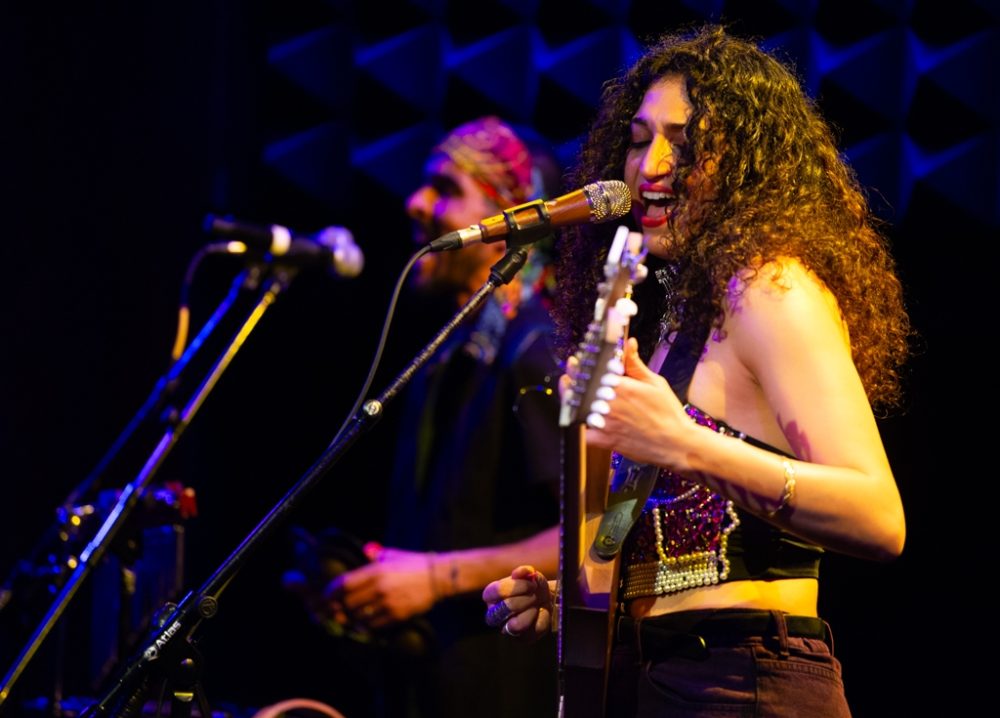
Bab l'Bluz has been the brainchild of French musician Brice Bottin and Moroccan musician Yousra Mansoor since they first met in 2016 as part of a music collective in Morocco that was combining modern jazz and traditional Gnawa music. The duo bonded over their love of Gnawa, but also the blues and rock. They quickly found their groove, formed a quartet, and composed 10 songs that eventually became their first album, Nayda, released in 2020 on Real World Records. Not bad for a new band. After touring worldwide and building their fan base, they released their second album, Swaken, in 2024.
They like to say they are not really a “world music” or “fusion” band, but would rather be identified as a rock band. And at their performance at Babel Music Expo, last month in Marseille, France, where we had a chance to see them, they absolutely backed that up. They rocked the house. But it's a fine line they dance around with Mansour kicking headbanging solos on her electrified double-necked guembri, while traditionally ululating vocally, and the hard rock beat of the drums is also accompanied by the rhythmic clanging of Gnawa castanets. Of course, they are not the first group by any means to meld North African music and Western rock, but they are definitely making a new interpretation for a new generation that grew up with the internet.
We scheduled a Zoom with Yousra and Brice after the Expo to get a chance to know them better as they are about to return to the United States for a brief tour beginning April 17th.
This transcript has been edited for clarity and length.
Ron Deutsch: So how are you?
Brice Bottin: Yeah, quite fine, but busy. Needing some rest. And we have to prepare all this stuff for the U.S. next week. It's quite difficult to go to the U.S.. So we hope everything will goes fine.
One thing that has been very important to you is your message of spreading love, peace, and respect through music, and I'm wondering in these globally very tumultuous times we are in do you still feel that you are able to make a difference?
Bottin: Yeah, for sure. Our audience are mixed with all kind of people, and when we play they realize that they'll enjoy the same stuff. I remember we were at the Oregon Sisters Folk Festival where there were these very American people with boots and you know, the cowboy style. And they really enjoyed our show, and even that Yousra was singing in Moroccan Darija, they seemed to having fun. They told us they enjoyed a lot the show and there are a lot of both points of convergence because of music. So we know that people who grew up in Oregon can like the same stuff that people born in Morocco or France or whatever. Because it's a bit rock and it's a bit trance. And in a lot of kinds of music, they can recognize themselves in it.
Yousra Mansour: I think music now is needed more than any time to bring people together. I think in these very difficult times, it's important to keep doing what you're doing – even though it's very hard because we can see the tension, and feel the tension in some places, where sometimes people will have less courage to go to a show, especially to go to a Moroccan show because maybe they don't speak the same language or don't have the same religion, or especially because of political opinions. But I think most people find their courage and they don't care. Then they see they might appreciate the same music and dance in the same way. And then they also stand and fight for peace. So we're not alone. A lot of people are also fighting for the same purpose.
Bottin and Mansour: It's why we do this.

I am very interested that you've made a point of talking about Darija, which is the language you sing in. For people who don't know about the language, would you tell me about it and why it became this thing to sing in?
Mansour: Yeah. Darija is a mix of a lot of languages – from colonizers and locals. You can find some Arabic words, some French, some Spanish, even some Portuguese words. So it's really a mix of all of this.
I grew up speaking Darija, but the native language in Morocco, which is not generally spoken is Amazigh, which is the language of the Berbers. They actually don't like being called Berber, so the word “Amazigh” has a more positive significance. It was sort of banned or forbidden years ago, but then the government restored it. And now even you can find people learning it at school, but my parents and grandparents, they didn't get the chance because it was banned. So Amazigh is the native language of Morocco, but not the whole population speaks it. And so Darija is like the combination of Amazigh, Arabic and other languages. So that's why it's the most popular language in Morocco. We say it's a dialect, though a lot of people say that it is fully Arabic, but I would say no, because a lot of people from the Middle East, when we start speaking in the region, they don't understand because there are many words in Amazigh. So it's a mix that only Moroccans understand. But then there's also “classical” Arabic, and in all the Arab-speaking countries, they use it for papers, institutions, and school, but the dialect of each country is very different than the classic Arabic. So there is also Algerian and Tunisian Darija, which are different, but they all have basically the same roots.
Staying with language for a moment, your first album is called Nayda, which I understand was this movement of opening Moroccan culture in the late 1990's. But there seem to be many ways to translate the word. I've seen it translated to “awakening,” “to rise up,” but “wake up,” and also “to party.”
Bottin: It's all true.
Mansour: We use this word now a lot as “to party.” Like when you say “nayda” in Morocco, everyone will understand that “it's a party,” but we use it as well, the way the movement used the word, for “awakening” or “to get to a certain point of consciousness.” And especially when you know that the movement began when some heavy metal musicians went to jail. They were called Satanists. The government said you can't wear black or this heavy metal fashion, and that's why went to jail. A friend of mine, Saâd Bouidi from the band Hoba Hoba Spirit – they're a politically-engaged rock band from Morocco – went to jail because of that.
Bottin: I think it always had two meanings, because a lot of Chabbi music, all the albums are called “nayda.”
Mansour: Yeah, I would say the true meaning of the word is really “to stand up.”
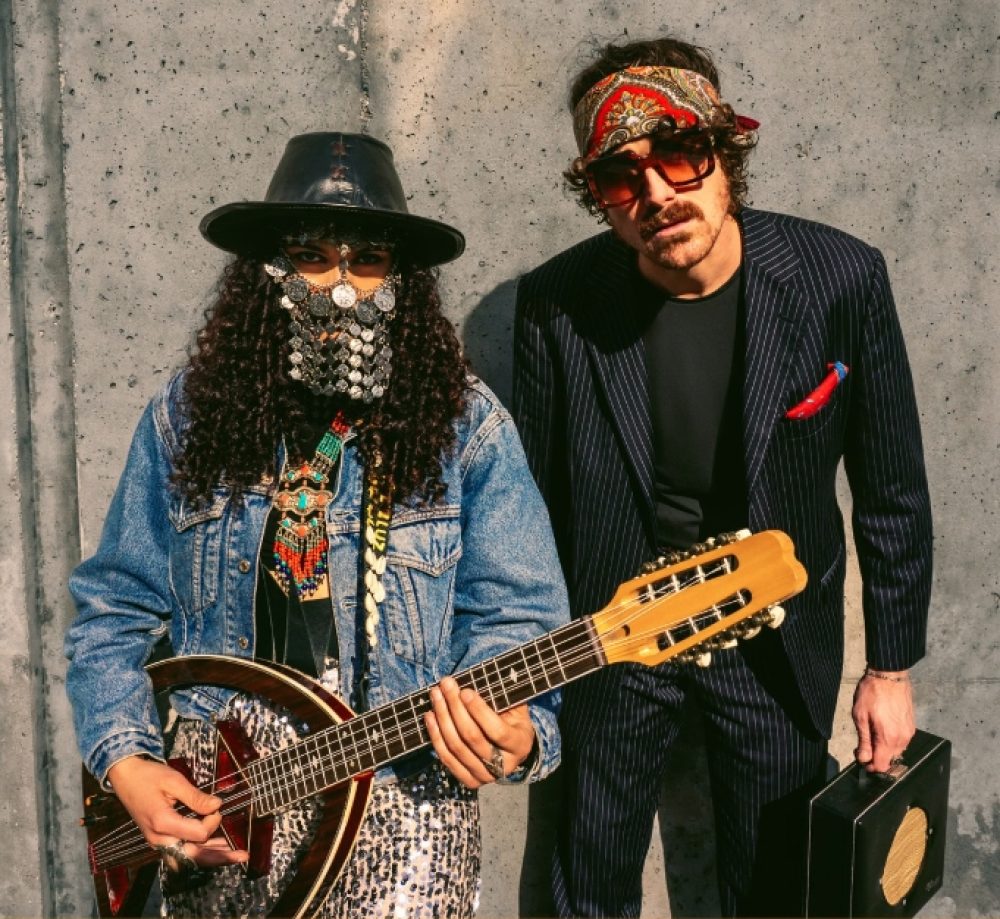
So it could mean “to stand up politically,” or “to stand up to have fun.” Is that double meaning why you chose it for your first album?
Mansour: I think it was important because these musicians who were fighting for freedom had been a big source of inspiration for me. When I was a teenager, I loved metal music, and I loved this Young Musicians' Boulevard Festival that opened the door to a lot of artists that came from this movement. It didn't matter if you are famous or if people knew you or not. If they saw you make good music, they'd just put you on stage and introduce you to a huge crowd. And it was great because before we couldn't see that many bands in Morocco, especially with women. So when the movement started, and this festival started, we saw a lot of artists. And for me, and my sisters, it was truly inspiring. Because we used to write some lyrics and play together, but now this festival made me believe that it is possible – even in Morocco – that a woman could see herself on a stage. It's not impossible. And when I met Brice and we started making music we thought that Nayda was the perfect name for the album.
And you first met through the Marrakech Jazz Beat?
Mansour: It was a big, big collective. It was it was great.
Bottin: I was in the collective before Yousra, there were different people and we were trying to make stuff with this great Gnawa master, to make songs and mix ideas. We had some residencies and we'd done some shows.
Mansour: When I joined it was in a hotel that had a rehearsal space. It was a residency. We'd spend the whole day to practice. And we met there for like ten days, and after we performed only like two shows. But before the collective did many shows.
And when you met, was it love at first sight?
Mansour: Kind of, yes. We were not playing guembri at that time. We started to learn together.
Bottin: We had a home studio and were producing at the same time we were learning the stuff. So we composed like ten tracks, and they were the first ten tracks on the first album. It was an idea to make a Gnawa power trio, but to replace the bass with the guembri, and the guitar with the awisha. And at the beginning it was tough, because these instruments don't allow you to put a big fuzz on them. So gig after gig, we created some new instruments to put the effects on. And we are still searching for some new stuff for a new album. Yousra had the idea to make a double-neck instrument and we introduced a new instrument in the band, the mandol, which has 10 strings plus quarter tones.
Mansour: He found it in a bazaar nearby in 2021.
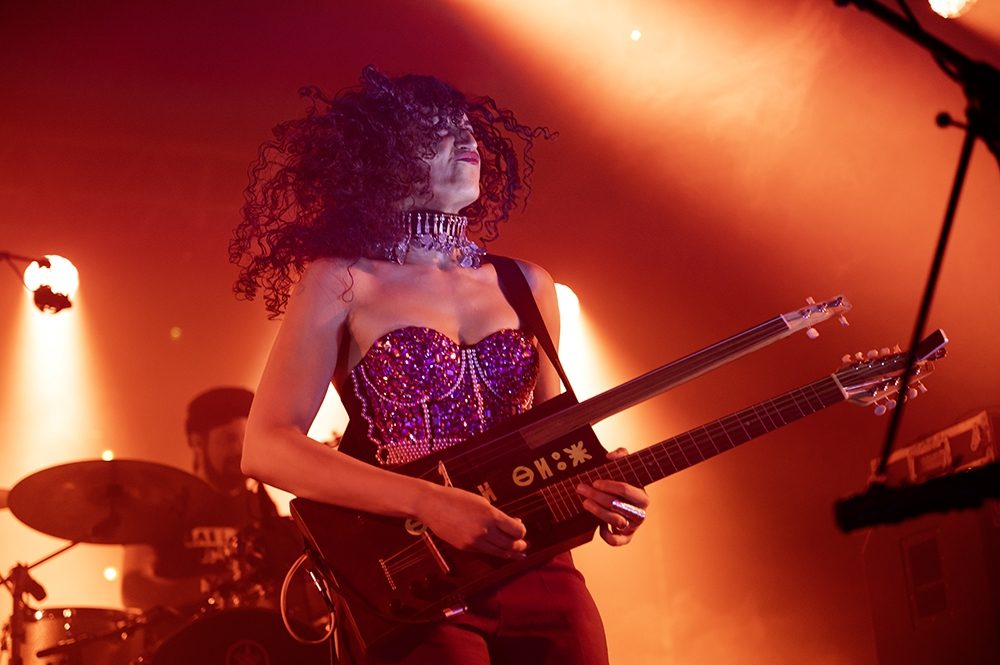
In Lyon where you live? And you built that double-necked thing yourselves?
Mansour: Yes. So, one neck is an awisha, which sounds like an ngoni, and the other is the mandol. which you find a lot in Algeria and Eastern Morocco, but with the quarter tones. And honestly, the idea of the double neck was just for flights, because we had a very difficult post-COVID tour in 2022. And with airlines, it was a nightmare. So even with one instrument, it was complicated. So we said, why not ask our crazy luthier to do this favor for us. And fortunately he did a great job and it made for both an interesting sound and visual.
Well, it looks really cool. Really gives you that rockstar look.
Mansour: Thank you.
I thought it was interesting to ask you, because you've said you grew up with the internet, you've been influenced by music from around the world. And I was wondering your thoughts, because there's both pluses and minuses to this, because while you have access to all this music and you can discover things on the internet that you would not have discovered previously. But at the same time, we're all sort of overwhelmed, and, for example, it may be hard for people to find you?
Mansour: Yeah, you're totally right. Now it's very difficult to introduce your music to a big audience because there are too many bands and a lot of artists using platforms and internet....
Bottin: I'm not sure there are more bands than before, but rather attention spans because of social media. But music production is more easy for everybody. And for me it's a good thing because you used to need a lot of money to make records, etc. So I think it's a good thing. But I think the only problem, it's more the attention of people. They give it 35 seconds, then they will swipe your music for the next. It's more that the problem I think.
Mansour: But I think there is also a very positive thing about internet, especially in Morocco. I didn't have this culture. In my culture, we don't pay to go and watch a show. It's mostly like music is everywhere and it's free. Well, a lot of people play weddings and this is like the only time the family making the wedding are paying the musicians. So it was mostly the CDs that my mum and dad had, because they were both hippies, I had the chance because they were open to different sounds. I had been interested in many artists, but I couldn't afford a CD. But I really loved Janis Joplin, and also Nina Simone. So when internet came, it was sort of like a magical, positive thing that happened. And I could watch videos. I learned guitar mostly on YouTube, watching videos of tutorials or of people playing. So I think it gave more positive than negative.
Bottin: I grew up without having internet until I was 18. So then I discovered a lot of stuff on YouTube. It was for me very interesting. And yeah, it opened my vision. It's more easy. I don't have to go to the library.
Mansour: But then also, like before you had to pay to buy a CD and the artists earn money from royalties. So maybe this is one of the negative parts of the internet that everything became easy access. So they have a lot of things to do now compared to before. So before I liked to go and watch concerts, because we couldn't watch the videos whenever you want. But now you can just watch a video on YouTube and feel like you are having a good time.
Speaking of albums, are you working on a new album now?
Bottin: We are not at the moment. But while we are on tour, we hope it will give us some ideas. But we are not in a hurry. I think we're not a band like to do a new album every year. We prefer to record when we feel it's the time to do it.
And you're going to be touring the U.S. starting next week, yes?
Mansour: We will play Saugerties in New York and also Joe's Pub in New York. Holyoke [Massachusetts] and then the Louisiana International Festival. And we also have a show in in Little Rock. And Seattle at the end. So we stay there for three weeks.
Bottin: But we don't like to do, like, one show each day, or so many shows because after you a bit you lose the, I don't know, like you feel like you're repeating yourself.
Well, have a safe and successful tour. It was a pleasure to meet you.
Mansour + Bottin: Thank you.
US Tour
4/17 SAUGERTIES, NY The Local
4/18 HOLYOKE, MA De La Luz Soundstage
4/19 NEW YORK, NY Joe’s Pub
4/25-26 LAFAYETTE, LA Festival International
5/01 LITTLE ROCK, AR Arkansas Museum of Fine Art
5/05 SEATTLE, WA Nectar Lounge
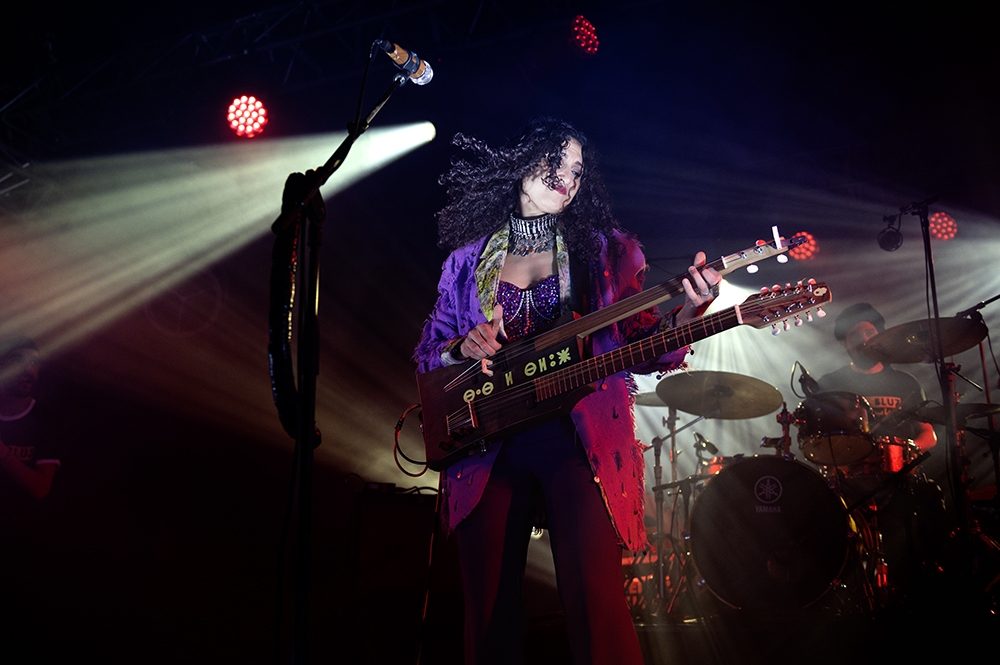
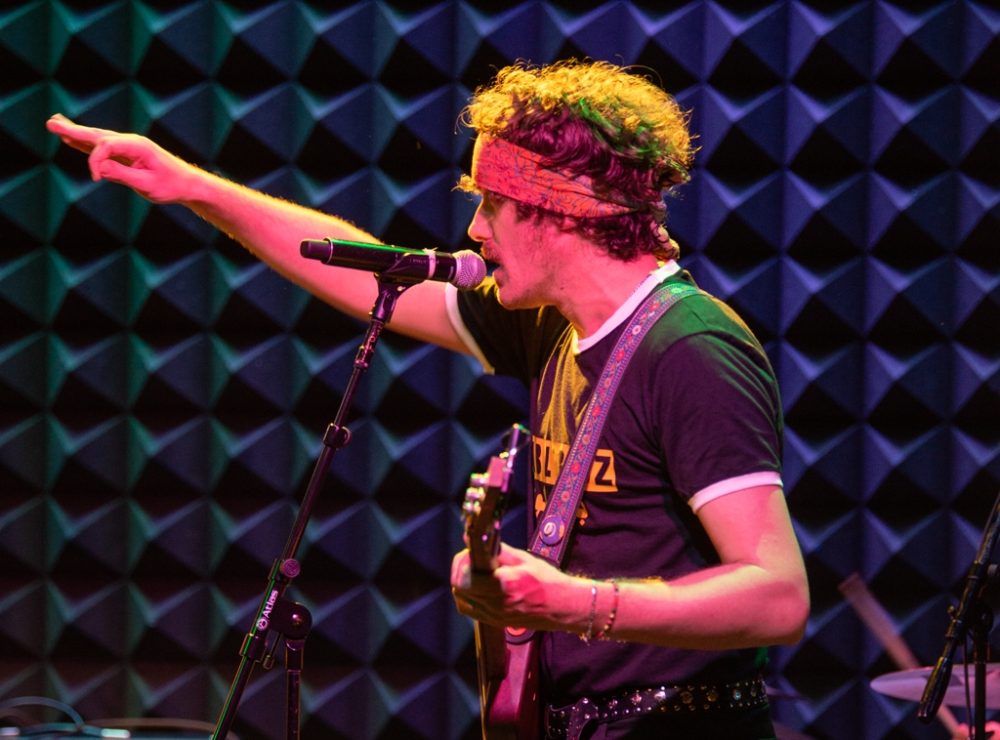
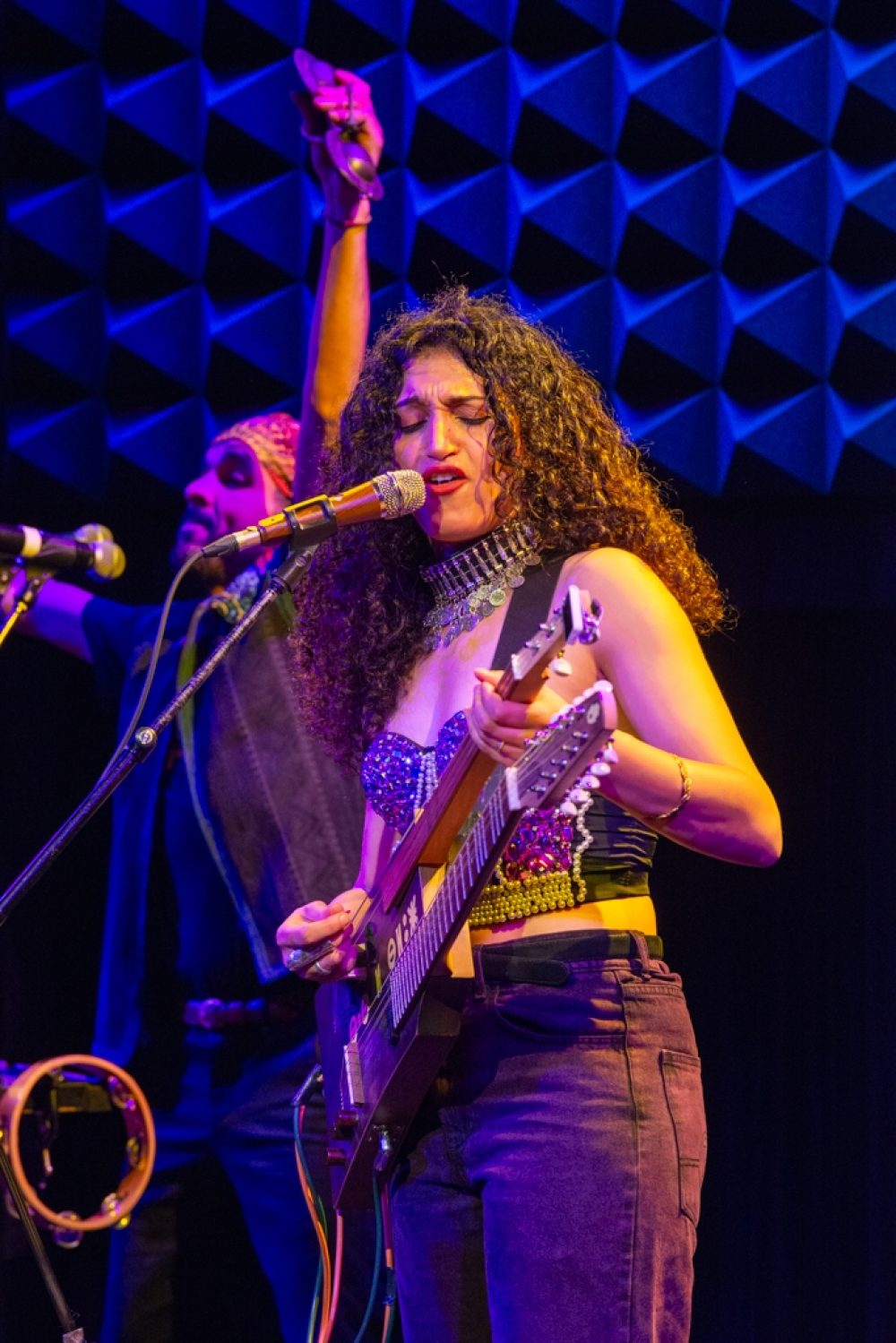
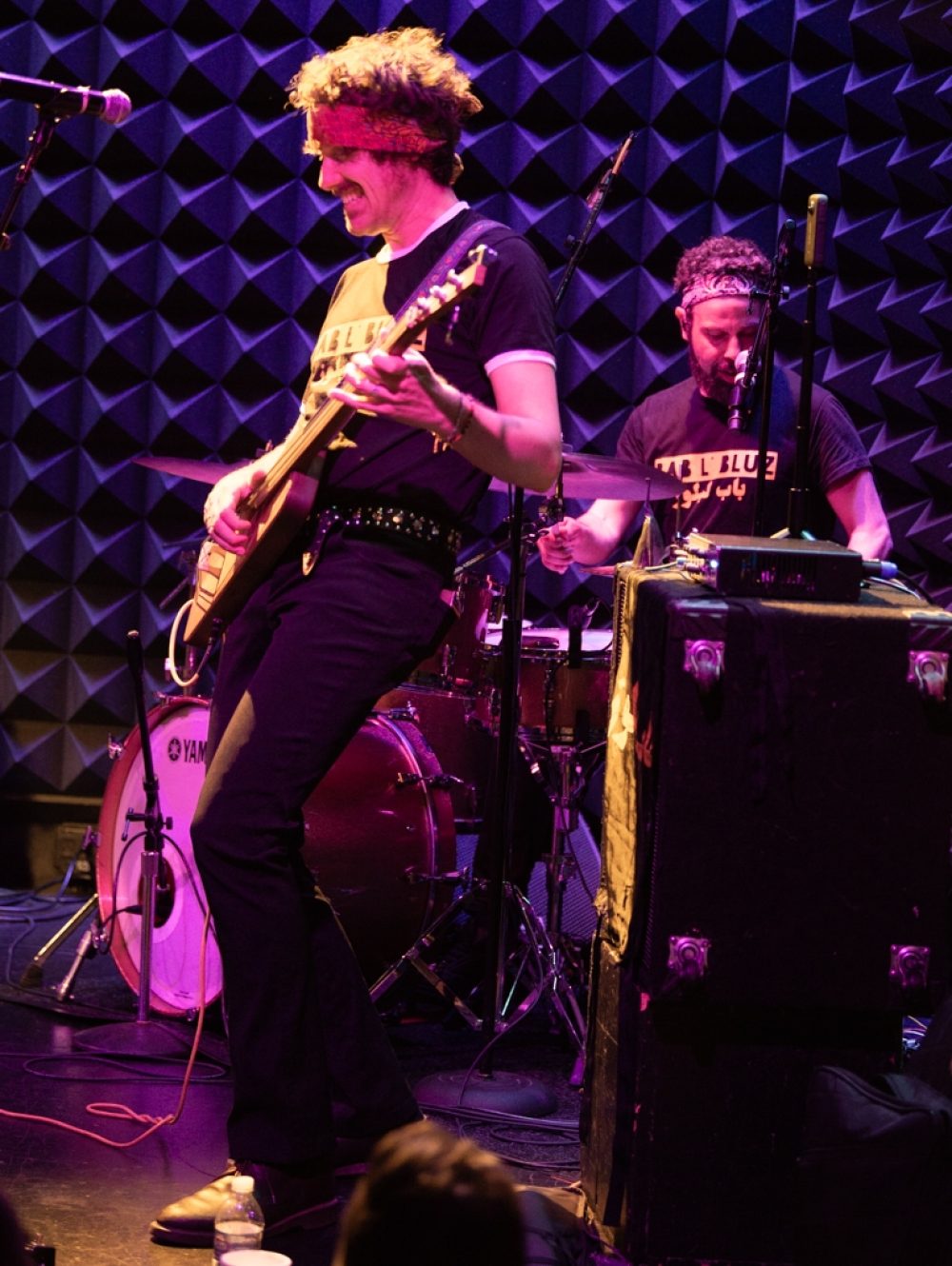
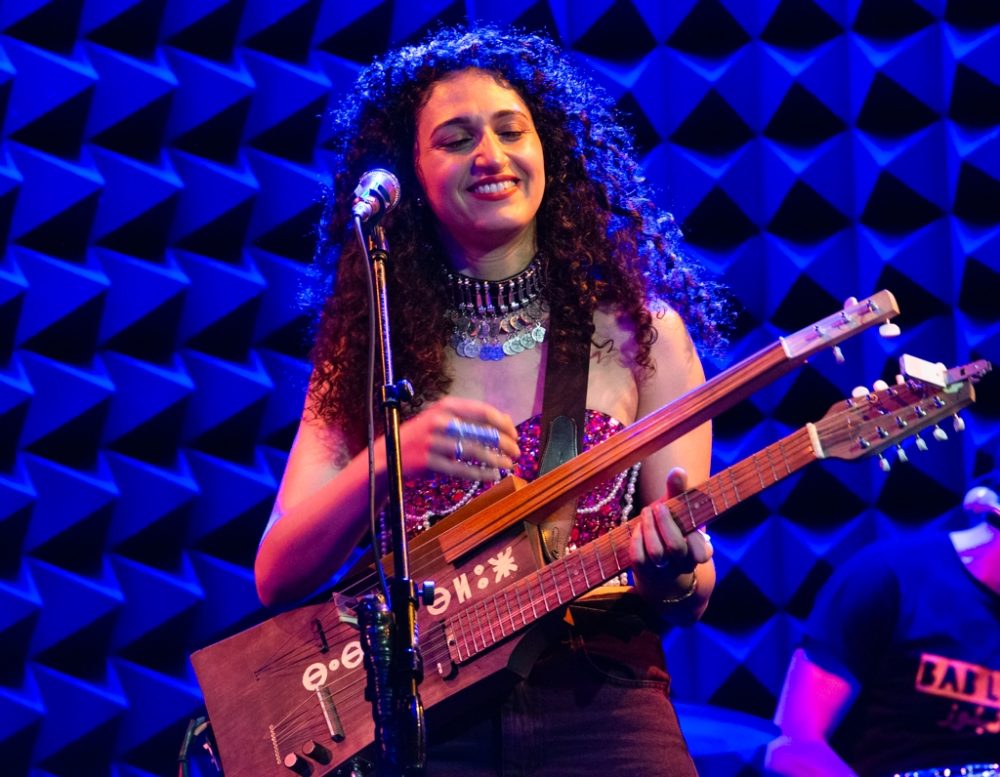
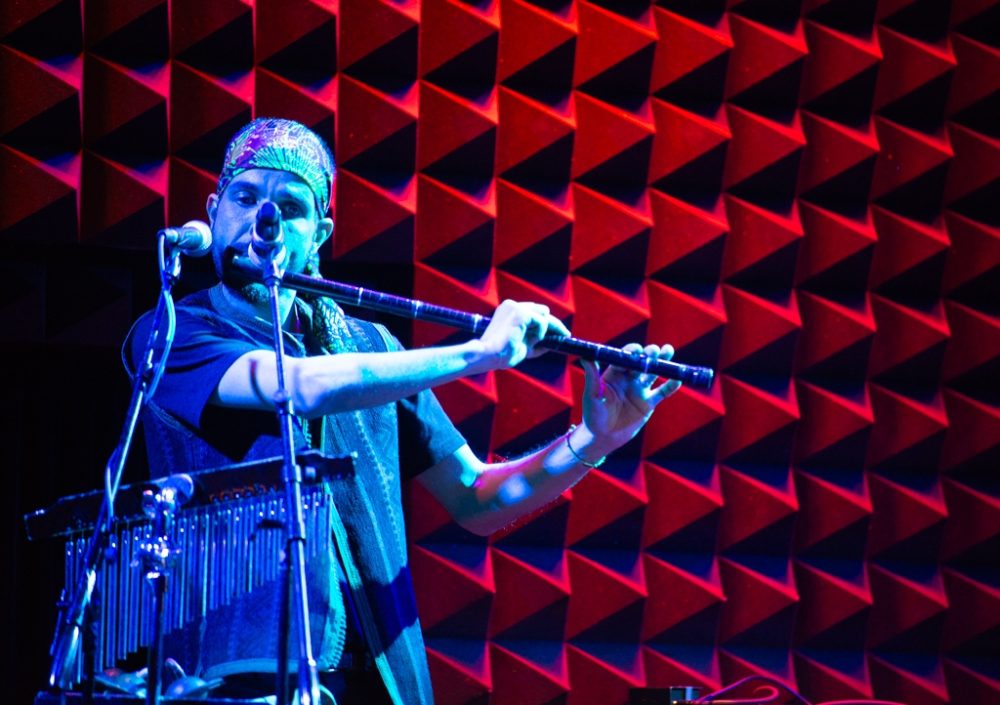

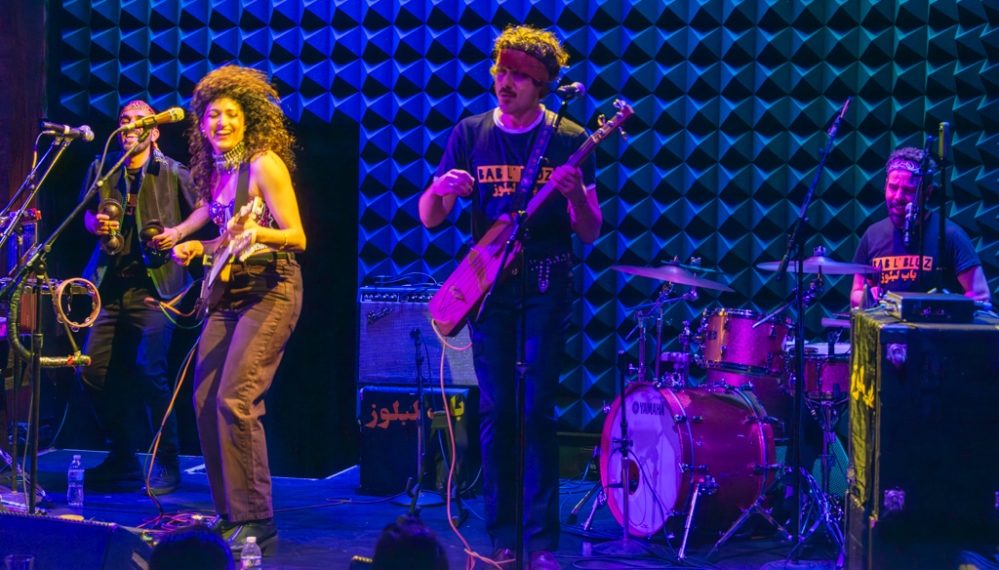
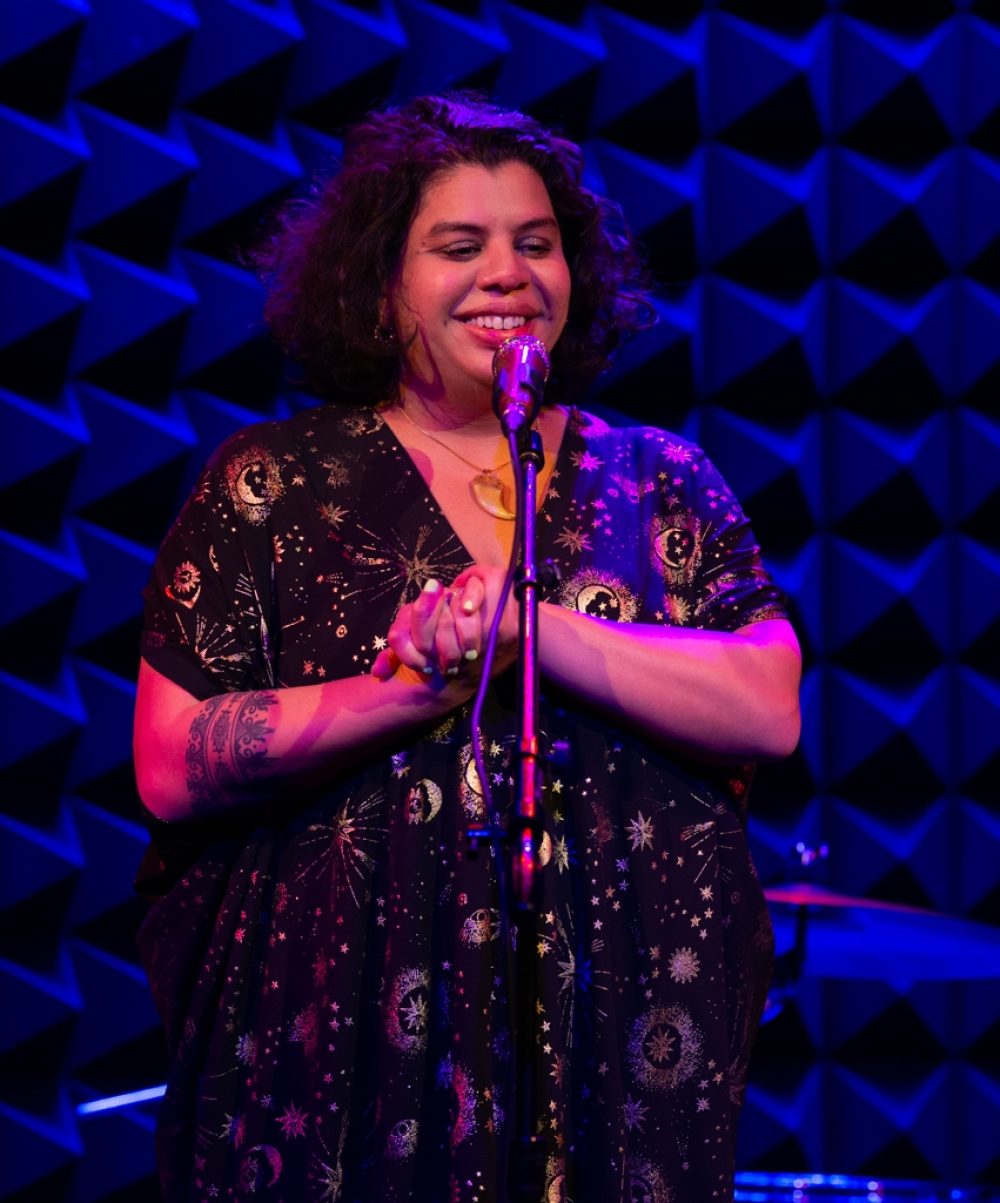

Related Audio Programs
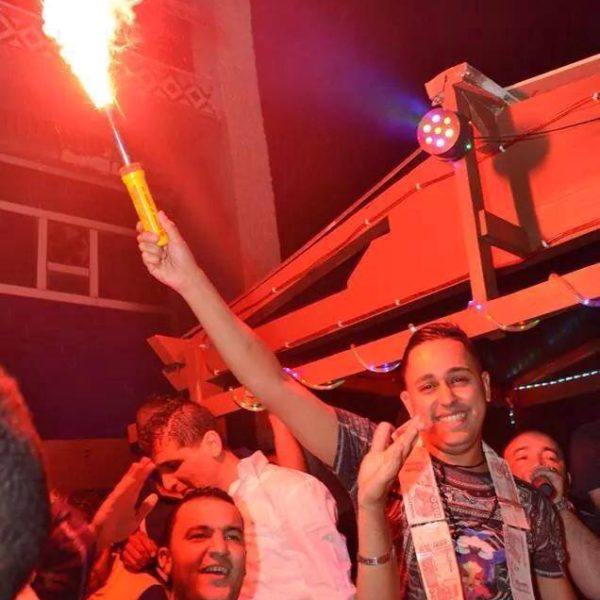
Related Articles
